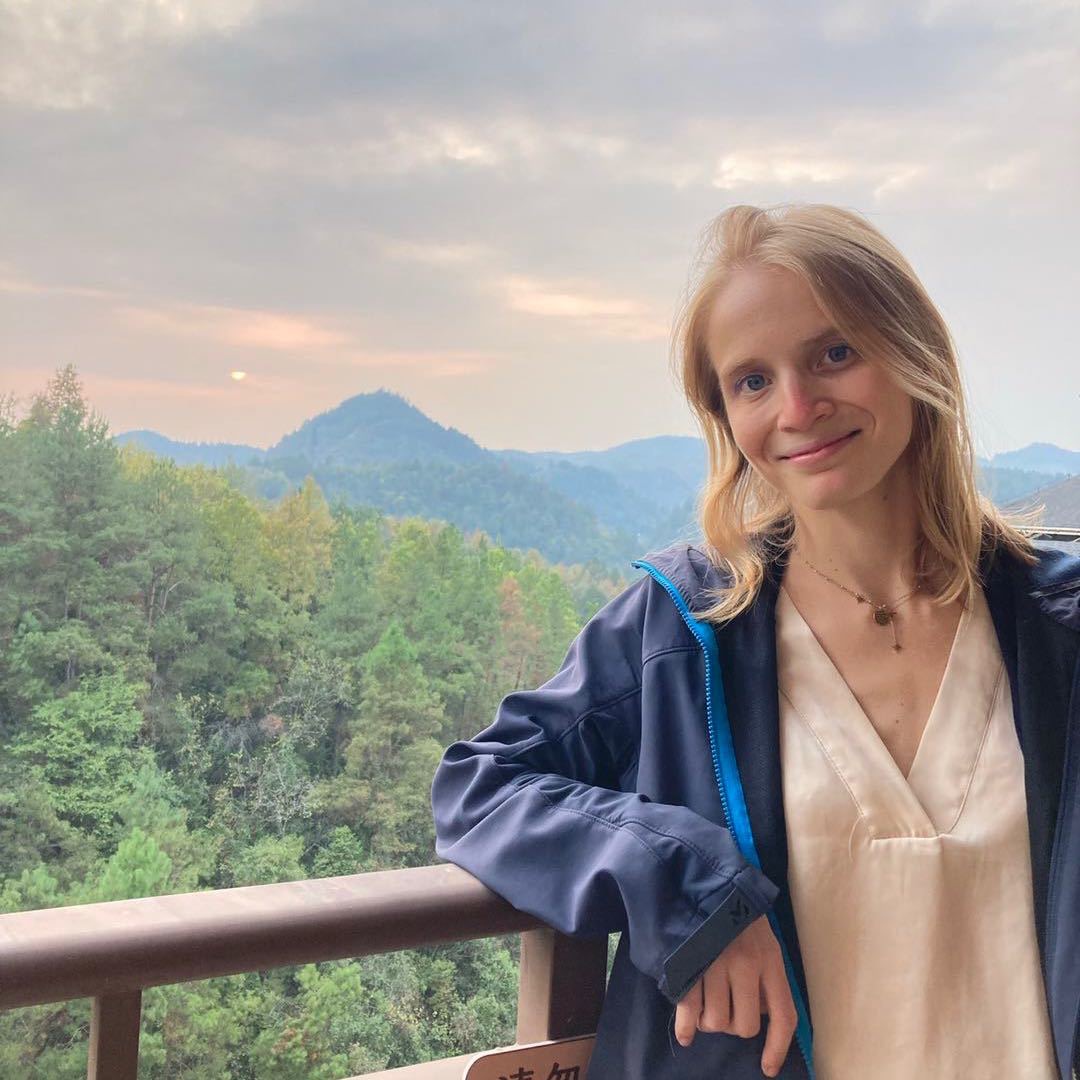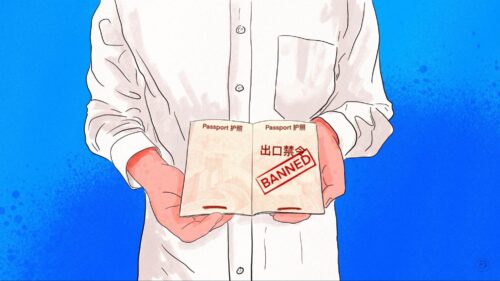Travel: A cross-cultural dive into Hani traditions in Yunnan
There are at least 25 ethnic minority groups in Yunnan Province, including 16 that are indigenous to the region. One of those is the Hani, whose people — as our author learns in her trek through a traditional village — are constantly striving to balance traditions with modern living.

After two hours of unfruitful back-and-forths with a hiking group tour arranged by my youth hostel, I decided to go to Nannuo mountain with another guide instead. Around 10:30 that morning I met Summer, a 5-foot-4 lady with stunning lush hair falling the length of her back. The large silver bangle attached to her wrist caught my attention; I later learned it is traditional jewelry of Akha culture, the branch of the Hāní 哈尼 (also called Ho) ethnicity she belongs to. I was surprised to see her wearing a loose beach-like dress, given that we were going to hike, but I was excited at the prospect of getting out in the mountains with a local guide.
Summer studied Thai in Yunnan’s capital city of Kunming, and now works as a part-time guide and teaches English. I was introduced to her the evening before at a travelers café, whose owner, as I read in my Lonely Planet China 2017 edition, is a local and knows many people in the area. Our plan was to hike a few hours in Nannuo Mountain and come back late afternoon. As we started driving, I repeatedly expressed my interest in staying overnight at Summer’s village, Mangang, though she had already warned me that it was too late in the day to reach it. We eventually set out to Mangang in Menghai county for a two-day hiking and overnight journey, the village located approximately 50 kilometers away from the border with Myanmar.
On the drive, we spanned a variety of topics, from the history of Akha culture to Summer’s dating experiences with foreigners. There are roughly 400,000 Akha natives in the world today, partly residing in the highlands of Yunnan’s Xishuangbanna and a significant proportion in neighboring Thailand, Laos, and Myanmar. They came to Southeast Asia from China at the beginning of the 20th century, a time up until which it is believed they ruled the Baoshan and Tenchong plains in Yunnan Province. It is still debated where the original homeland is — the Tibetan borderlands or farther southeast in Yunnan. Unlike the Dai minority, the other main ethnic group in Xishuangbanna, Hani do not have their own written language (though they do have their own language, “Avkavdawv,” Akha language). Akha also have their own religion, zahv, which emphasizes connection between the people and their land; rituals and family life are also at the heart of their belief system.
Through my discussions with Summer, it occurred to me that despite living a life that we would qualify as “modern,” she is fervently attached to the idea of preserving Akha culture and traditions. This entwinement between modernity and tradition made me appreciate how intrinsically linked these two parts of her life seem to be, even if they appear to pertain to two drastically different worlds. Incidentally, Yunnan itself seems to reflect this ambivalence; there is a saying about the province’s weather: “Rain to the east, sun to the west.” It is typical to rain heavily for 20 minutes before it suddenly gives way to warming sunshine, as we experienced on our way to the village. We had to slow down while making our way through the tea plantations, the car’s windshield wipers struggling to sweep away the rain that was accumulating.

Later that evening, we prepared dinner with Summer’s younger sister, Shan Zhu, having arrived at her place in the early afternoon. My arrival, being the only foreigner in the village, did not seem to disrupt or attract any particular attention. Summer greeted her neighbors and acquaintances as we passed by, prompting a brief wave in return, and occasionally initiating a quick catch-up conversation. It seemed to be a day like any other, the villagers going about their regular activities. We had first stopped by Summer’s older sister’s house for some tea, where I tried to decipher some words from their discussion in Akha, but in vain. Shan Zhu lived a few minutes away, at the heart of one of the three contiguous villages that made up Mangang. Around 130 families make up their village, totaling above 600 people.
I soon learned through conversations with her sister that she does not enjoy the city at all and lives a fairly frugal life here in the village — she spends most of her days cultivating tea, cropping organic fruits and vegetables, and reading. Most of what she owns she never bought herself. Despite an apparent rudimentary lifestyle, she is highly interested in learning more about different religions and systems of thinking. She is currently studying Buddha’s teachings on the Wheel of the Law, which in Buddhist doctrine represents the crushing of all delusions and superstitions the same way a wheel crushes anything it passes over. Her apparently simple yet intellectually stimulating lifestyle made me question the need for extravagance in life.

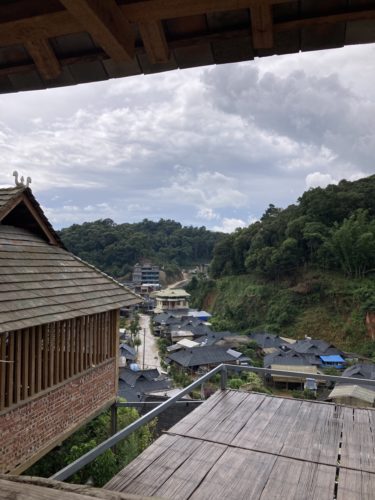
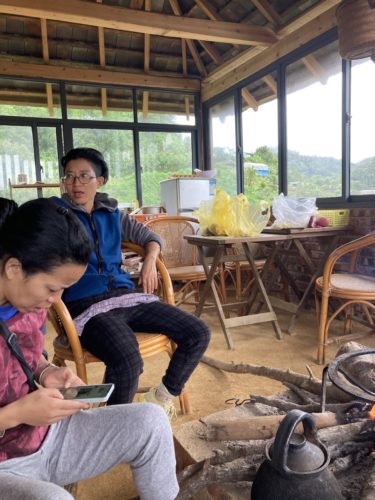
Summer has an uncle who owns a guesthouse in the village, which we went to overnight. His name is Akaran Shuoshan — he was previously a police officer, worked in the county’s propaganda department, and held a post in the Justice Department of Xishuangbanna prefecture. Since then, Shuoshan has become an award-winning author and artist, collecting 10,000-plus followers on Douyin (the Chinese version of Tiktok), while his paintings and writings have been featured in publications across China since 1996. His wide-ranging interests include creating paintings and sculptures that depict Hani culture, designing traditional clothes, and learning languages, being the only other person in Summer’s family who can speak some English.
The room reflected his artsy style, with local ethnic touches. Shuoshan, similarly to Summer, strives at the intersection of modernity and tradition — he is deeply attached to his roots and ruthlessly dedicated to preserving his own heritage, but has shamelessly embraced the modernity of Chinese lifestyle as demonstrated by his notable followership on Douyin. Indeed, his art career and the work he has done to preserve his cultural heritage have attracted interest beyond his village, especially because he massively promotes his content on his WeChat account. This was an uncommon occurrence given the remoteness of the village and the distance that separates it from the closest modern town, but Shuoshan’s rather unconventional background has enabled him to become known past his own village. He told me that in the past he used to leave the village more regularly to promote his art and meet people in the field.
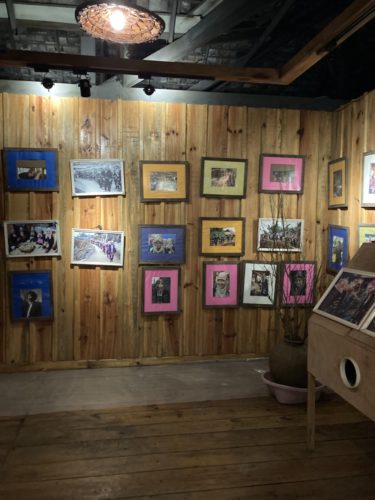

He showed me and other guests around his house, the place having effectively become a museum resembling an Alibaba cavern with countless paintings, photos, and traditional Hani clothing. We spent the evening chatting around a fireplace: “My artworks have been used to make stamps. These were printed by the French post in 2019. This one is from the Dutch post — each one costs one euro.” We sipped fresh Pu’er tea, listened to Hani traditional songs on the themes of family and life in the village, and shared about our respective cultures. Shuoshan also teaches local songs to the villagers, which we were able to enjoy some of that evening.

On the way back to the city, we stopped by a Dai temple, run by one of Summer’s monk friends. She qualifies him as “unconventional”; indeed, he had decided to paint his temple white, going against the traditional golden edifices one can enjoy in Jinghong at Xishuangbanna’s center. He has also created a trail behind the temple to venture into the surroundings because he enjoys hiking — a little escape from his daily routines.
Summer told me she comes back to her village every two weeks or so — to visit her relatives, of course, but also as a way to stay connected to her roots and in touch with a part of her that forms the core of her identity. “Even if I have my separate life in Jinghong, and I enjoy doing work as a guide, I need to come back to Manhang every so once in a while,” she says. “Otherwise I go crazy in the city.”
She jokes that she mostly misses her dog, Baorui. Whenever she returns, she insists on speaking in the local dialect with the villagers, despite having the option to converse in Mandarin. She also owns a small apartment in Menghun, a town close to her village. Although she rarely stays there, she keeps it in case some members of her family need to use it. Like her uncle, she continues to design traditional clothes and items, such as small bags made of local fabrics in Akha-style fashion, characterized by indigo, pink, orange, and green linings that are sown onto black cotton fabric. These are used as decoration in her Jinghong apartment, and she occasionally gifts them to her closest friends. Her older sister is also committed to protecting their cultural heritage by participating in dance and singing competitions around Yunnan Province.
“It’s a shame that children here no longer learn our local dialect. At school, they’re being taught standard Chinese instead,” Summer says. “The moms at the village also predominantly speak in Mandarin with their kids, hoping that it will help them access better work opportunities outside the village.”
While she understands these underlying motivations, especially given that she herself lives half of the time in a booming urban city, Summer believes that these attitudes reflect a lack of trust and identification with their culture. She eventually adds, “I’m aware that Akha culture might eventually disappear, but by continuing to speak the local dialect, we can slow down the process and protect as much as possible what is left of it.” From her perspective, life will be more beautiful if tradition and modernity remain united.


